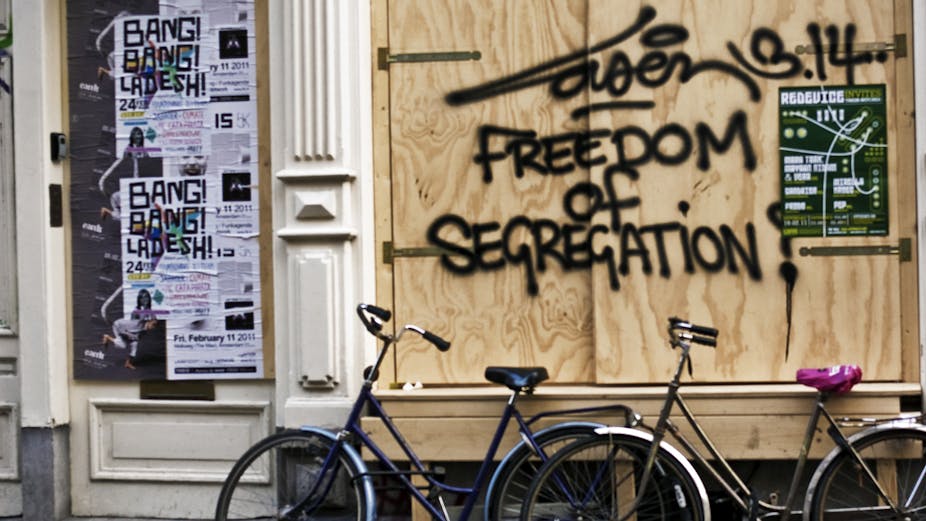While mourning the loss of Nelson Mandela, many are also celebrating the staggering achievement of those who struggled with to overthrow apartheid in South Africa. Lest we forget, apartheid means separation or segregation on the grounds of race. There is overwhelming consensus that racial segregation is intolerable in a civilised society. Yet, until an apparent intervention by Downing Street, the policy maker in the citadel of learning in Britain – Universities UK – appeared to have given the green light to segregation, on grounds of gender.
In its guidance on the use of external speakers on campus, the following recommendations are provided:
Segregation in the context of the facts outlined above would only be discriminatory on the grounds of sex if it amounts to ‘less favourable treatment’ of either the female or male attendees …
Concerns to accommodate the wishes or beliefs of those opposed to segregation should not result in a religious group being prevented from having a debate in accordance with its belief system.
Universities UK chief Nicola Dandridge, defending the document, stated that gender segregation “is not completely alien to our culture”. Basically, this is an accommodation to university Islamic societies which demand that meetings they organise are segregated on gender grounds.
The guidelines were given as hypothetical case studies but the reality is that gender segregation on campus has been quietly tolerated until now. One outcome of the document was that it has brought the issue into the open – including protests and media coverage of the issue.
And on Friday evening, following comments by the Prime Minister David Cameron, that segregation on campus should not be allowed, there was an apparent change of direction. Universities UK said the guidance was being withdrawn while it reviewed its stance.
There is a wider issue, though. Recently, in the furore over the failings of the Al Medinah free school, it transpired gender segregation was de rigueur. But once you allow segregation along the lines of faith at school, it is not at all surprising that when these pupils enrol at universities, they demand the same rights. If these are granted, you have the beginnings of the corrosion of the core values of academia, which are progressive and secular.
The same point was notoriously made in the Plessy vs Ferguson case in the US in 1896. The Supreme Court upheld a Louisiana segregation law on the grounds that segregation does not mark “the coloured race with a badge of inferiority” unless “the coloured race chooses to put that construction”. This judgement provided the principle of “separate but equal” and paved the way for de facto apartheid in America. It was not until the Brown vs Board of Education in 1954 that this was reversed under the principle that separate facilities were inherently unequal.
Universities UK ought to pay heed to this important principle, but the law also needs to be firm on this issue. Indeed on Friday night, the body pointed out that the legal position in the UK remained unclear on whether the voluntary separation of men and women could be allowed at events such as lectures on Islam by visiting speakers.
But there is hope. It is pleasing to note that Chuka Umunna, the shadow business secretary, has taken a firm stance on the issue. He told BBC Radio 4’s Today programme that a future Labour government would outlaw segregation on campus. A spokesperson for Cameron said the prime minister also wants a ban on gender-segregated audiences on campus, but not in places of worship.
But government must now be pressed to pass a law that bans gender segregation in public places.
Prior to Universities UK developments, the LSE took its own misstep. At the fresher’s fair in October, two students of the Atheist, Secularist and Humanist Society (Abishek Phadnis and Chris Moos) were forced to remove their “Jesus and Mo” t-shirts by security guards and officers of the Student Union. What were the grounds for this brazen attack on a peaceful freedom of expression? The t-shirts were deemed to be creating an “offensive atmosphere” and could constitute “harassment”.
Unsurprisingly, this has generated much publicity and rancour; lawyers defending the two students are asking for assurances from the LSE management that freedom of expression – a bedrock of universities – will be guaranteed in the future.
There is another consideration which may be a factor in all this. Given cuts to university funding, universities are scrambling to recruit overseas students. In view of the income that can be generated from their fees, this is an effective strategy. From this perspective, it makes sense to accommodate as much as possible of the cultural and religious belief systems of students from Muslim-majority countries in particular; which tend to be more restrictive than those of students from some other countries. The toleration of gender segregation and the curtailing of freedom might help the recruitment drive. But that doesn’t make them right.
The lesson from these two recent events is that the spilling over of religious sensibilities into academia is a clear and present danger to values that have long been cherished. We must defend them with vigour.

